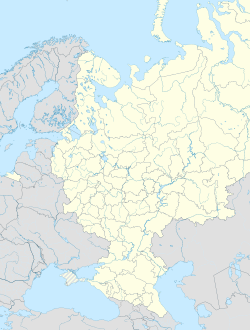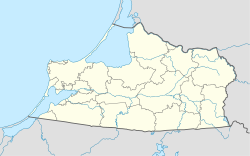Lost place
Sori / Posegnick Зори, Позегник
Location in the western part of Russia
Location in Kaliningrad Oblast
Sori ( Russian Зори ; formerly Позегник , German Posegnick deserted village in Pravdinsk Rajon in the Russian Oblast of Kaliningrad in historic East Prussia since 1975 .
geography The landscape near Sori was shaped by the Fennoscandian ice sheet and is a postglacial , hilly, forested ground moraine that lies in the catchment area of the Pregel River ( Russian: Прего́ля Pregolja ). The region belongs to the Baltic ridge .
The village desert Sori lies on the river Omet ( Russian Стоговка Stogowka ), about four kilometers southeast of Schelesnodoroschny ( Железнодорожный , German Gerdau ). North of the desert runs the trunk road 27A-028 (formerly A196 , former German Reichsstrasse 131 ) Kaliningrad - Schelesnodoroschny - Krylowo Königsberg – Gerdauen – Nordenburg ) and south the state border between Russia and Poland.
history Originally this Prussian landscape was inhabited by the pagan Prussians ( Natangen ). After Christianization by the Teutonic Order , it belonged to the Teutonic Order State . After the Battle of Tannenberg (1410) and the Second Peace of Thorn in 1466, the region became part of the Duchy of Prussia . The Prussian administrative reforms after the Congress of Vienna was created on February 1, 1818, the county Gerdauen in the administrative district of Kaliningrad in the Prussian province of East Prussia .
In 1437 there was one in Posegnick Freigut and nine Bauerhufen. After the Thirteen Years' War (1454–1466) Posegnick belonged to the lands that were lent to the von Schlieben family and remained in their possession for centuries. In 1831 Konrad von Romberg (1783–1833) bought the goods; Posegnick was separated and found several new owners over the years. The Posegnick estates came to Johannes Hermann Neumann through inheritance and sale in the second half of the 19th century and remained in the possession of this family until the spring of 1945. Around 1895 the estate with its works was 705 hectares in size.
In April 1874 the administrative district of Kanoten (Kanothen) was formed with the Posegnick estate . In March 1932 it was renamed the Posegnick District . The reason for this was the end of the independence of Kanoten as part of the merger of the places Doyen (1938 to 1945 Dugen , Polish Duje ), Kanoten (Polish Kanoty Korklack (Polish Kurkławki rural municipality Posegnick.
After the First World War, the Rastenburger Kleinbahnen were expanded and the Barten – Gerdauen line was relocated with a stop in Posegnick.
In 1933 there were 536 inhabitants in Posegnick, and in 1939 there were 663 inhabitants.
During the East Prussian operation Posegnick was captured by the Red Army in the spring of 1945 and placed under the Soviet command. After the end of the war , the region with Posegnick became part of the Soviet Union. The resident German population, if they had not already fled, was subsequently expelled. The place was initially called Позегник , which is simply the transcription from German, and from 1950 Зори Sori - since 1975 it has been a deserted village.
church Until 1945 Posegnick was parish in the Protestant parish of Gerdauen in the church province of East Prussia of the Church of the Old Prussian Union and in the Roman Catholic Church of St. Bruno Insterburg (Russian: Chernyachovsk ) in the Diocese of Warmia .
Personalities
Johannes Neumann (1817–1886), landowner in Posegnick, and member of the German Reichstag, died on June 13, 1886 in Posegnick
Erich von Lojewski (1909–1970), German journalist, editor and writer lived in Posegnick from 1943 to 1945
Wolf von Lojewski (* 1937), lived as a child from 1937 to January 1945 on the Neumann family estate in Posegnick
literature
Posegnick in; Wulf D. Wagner : Culture in rural East Prussia. History, goods and people in the Gerdauen district . Vol. II, Husum Verlag 2008, ISBN 978-3-89876-467-4 , pp. 963-969. Web links Individual evidence
^ Posegnick - East Prussia
^ Posegnick district
↑ Michael Rademacher, German-Austrian local register, Gerdauen district
^ Walther Hubatsch , History of the Protestant Church in East Prussia , Volume 3 Documents , Göttingen 1968, p. 457
↑ Posegnick at GenWiki
↑ Lojewski, Wolf von
Ackerau (Armeiskoje) | Adamswalde (Novo-Galitscheski) | Adolfschlieben | Adolfswalde (Dalinino) |
Agnesenhof (Kurortnoje) | Albrechtshausen | Albrechtsheide | Allenburg [Fh.] | Allenburgsfelde | Allenburgshausen |
Allendorfshof / to Groß Allendorf | Altenweg [Fh.] |
Alt Lenkutschen / to Großlugau | Angarben | Annawalde [village] (Smolnoye) | Annawalde [Gut] (Frolowa) | Arnsdorf (Smeloje) |
Aue I / to Groß Allendorf |
Aue II / to Groß Allendorf | Jittering | Bannitten | Bawien [Fh.] / Baudenwald (Krupskoje) | Berszlack / Bärslack (Narwskoje) | Decision | Bettyhof (Rylejewo) | Birkenhof | Birch jug | Blankenau (Jerschowo) | Blekitten | Blendowen / Blendau (Barejewka) | Planks (Olschanka) | Bolzinshof | Bractin | Break |
Budwischken / Oberndorf (Bystrjanka) |
Carlswalde (Krupino) | Christophsdorf (Baranowo) | Damerau [Gut, Kr. Gerdauen] (Degtjarewo) | Damerau [Kr. Wehlau, Ksp Allenburg] | Detlevsruh |
Dietrichswalde (Podlessje) | Ditthausen (Krasny Bor) | Döhrings (Derschawino) | Domnaushöfchen | Domnauswalde (Galkino) | Eberswalde [Kr. Gerdauen] (Mochowoje) | Eberswalde [Kr. Prussian Eylau] | Eichwalde (Anochino) | Eisenbart (Konstantinowka) | Eiserwerk | Elisenau |
Elisenthal | Ellernbruch (Watutino) | Angel's height (Ilyichewo) | Ernstwalde (Chekhovo) | Escherwalde (Lemechowo) | Ferdinandshof | Finkenhof | Föhrwalde | Franzenshof (Wasnezowo) | Frederikenruh (Dawydowo) | Freudenthal | Friedrichsdorf (Salskoje) | Friedrichsfelde (Pechorskoje) | Friedrichsflur (Aralowo) | Frisching [Fh.] | Frisching [Kr. Prussian Eylau] (Prochladnoje) [partly] | Gendrinn / Gendern (Wschody) | Georgenwalde (Poleschajewo) | Gerdauenhöfchen (Tichonowo) | Gerdauen Stadtwald [Fh.] | Gertlack (Jelnino) | Glassworks (Dalneje) | Gomischken / Gomingen (Dalni) | Gostkov (Raskovo) | Gräbenswalde (Pereleski) | Grasmark |
Groß Allendorf (Kostromino) | Groß Dwillon / Großwillingen (Kulibino) |
Groß Engelau (Demjanowka) | Groß Haferbeck (Komarowo) | Groß Potauern (Perekrestki) | Large Pothlack | Groß Schellenberg (Ogarjowo) | Groß Schönau (Peskowo) | Groß Szemblonen / Groß Schemblonen | Green tree (Sokolniki) | Gundau (Ossipenko) | Haferbeck [Fh.] | Hansenhof [Fh.] | Hansfelde | Hanswalde (Alexejewka) | Hanswalderthal | Hedwigsfelde (Golowkowo) | Heegewald [Fh.] | Heinrichshof [Kr. Gerdauen] (Plodowoje) | Heinrichshof [Kr. Wehlau] | Herrendorf (Krasny Kut) | Hohenberg | Hohen Damerau (Kostino) | Idashof | Jägersdorf (Belaja Poljana) | Juganeusaß / Odertal (Jurowo) | Combs break | Kampenbruch | Karlshof | Karolinen (Donskoye) | Karolinenhof (Svjosdnoye) | Katzborn (Makejewka) | Cautery (corn buoy) | Kiauken / Kauken (Molodzowo) | Klarahof (Stepanowo) |
Klein Allendorf / to Groß Allendorf | Klein Dwillin / Kleinwillingen (Malejewo) | Klein Engelau (Pawenkowo) | Small field | Klein Gerdauen (Schaposchnikowo) | Klein Haferbeck | Klein Klitten (Storoschewoje) | Klein Mauen / zu Ernstwalde | Klein Neumühl (Selsy) | Klein Pothlack (Rasdolje) | Klein Rädtkeim (Karelskoje) | Klein Saalau (Sarja) | Klein Schellenberg (Stanislavskoje) | Klein Schönau (Oktjabrskoje) | Klein Schönlinde [Fh.] | Small six-hats | Little Sobrost (Obilnoje) | Small residential village | Königsfelde (Wostochnoje) | Königstann (Selzy) | Crooks (Novo-Galitschesky) | Krügerwalde (Rasdolje) | Kühnbruch | Kühnhagenbruch | Kukehnen (Ladoschskoje) | Kummerau | Lablack (Ljublino) | Lawdt | Lawo (Krupino) | Lehmhöfel (Lemechowo) | Liebenau | Lindenhof | Lisettenhof | Lönkendorf (Prudki) | Lomp | Delete (Lawrowo) | Louisenberg |
Louisenwerth | Ludwigsburg (Stanislawskoje) | Luxhausen | Marienberg (Petrowka) | Mauenfelde (Kljutschi) | Mauenwalde (Nekrassowo) | Meisterfelde (Saretschje) | Melchersdorf (Ilyushino) | Meludwiesen | Miggenthal (Mendelejewo) | Moritzblick | Mill jug |
Mühling (Cholmogorje) | Muskau (Olenewo) |
New Lenkutschen / to Großlugau | Neuendorfshof (Odojewskoje) |
Neusasserei (Gratschowo) | Neuwaldau I | Neuwaldau II |
New Waldeck (Kaschtanowo) | Nob | Nunnery (Gordejewo) | Nubertshöfen (Obuchowo) | Upper Blankenau (Cherkassovo) | Oberteich | Olk |
Oschkin / Oschern (Korolenkowo) |
Partsch (Kholmogorje) | Pelklack | Pempienen [Fh.] / Hufenwald [Fh.] | Peterehlen (Vyazemskoye) |
Petrineusaß (Luschki) | Plaitil / Plattau (Tarassowo) | Plaustendorf (Bereschki) | Pöhlenwalde | Pohiebels | Polkitten |
Posegnick (Sori) | Potavern (Potapowo) | Prock |
Progen (Pospelowo) | Prowarken | Rädtkeim | Rambsen (Klutschewoje) | Randenau | Rathsthal (Ranneje) | Redden [Kr. Friedland] (Pogranichnoye) | Redden [Kr. Wehlau] (Retschnoje) | Rehfließ [Fh.] | Reimerischken / Reimershof | Reinken [mill] | Rosanna / Rosenflur (Rogowo) | Rosenthal (Schelesnowo) | Sandelsruh / Nordenhof | Sounds (Beresniki) |
to Schiffuß (Kachowskoje) | Slithering grouse (Marjino) | Seamstress (Berjosowka) | Schneider angle |
Schönbruch (Schirokoje) | Schöntritt (Krasnoye) | Schönwalde (Rasswet) | (to) Schönwalde [Vw.] (Snegirewo) | Schönwiese (Simowskoje) | Schwönau (Perrwalowo) | Sechshuben [Kr. Wehlau] |
Sokallen (Perowo) | Sophienberg (Djatlowo) | Sophienthal (Demjanowo) | Sortlack | Woodpecker House [Fh.] | Spierau (Bestuschewo) | Sporgel | Stadienberg [vw.] | Stadium courtyard | Steinwalde |
Valley germ (Ptschelino) | Tappelkeim | Treghof | Trenkensruh (Kovalevskoye) | Trilinde (Annowka) | Trotczin / Trotzenau (Ostrowki) | Waldeck | Wangnick | Warlin (Sovetskoye) | Wesselbruch | Wessolowen / Wesselau (Pushkinskoje) | Wickerau (Cherkassovka) | Wilhelmshöhe (Owraschnoje) | Wilhelmshof (Marinowka) | Wittenfeld | Woopen |
Brickyard (Malachowo)
<img src="https://de.wikipedia.org//de.wikipedia.org/wiki/Special:CentralAutoLogin/start?type=1x1" alt="" title="" width="1" height="1" style="border: none; position: absolute;">

